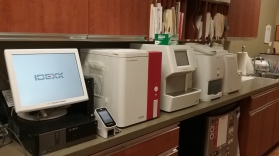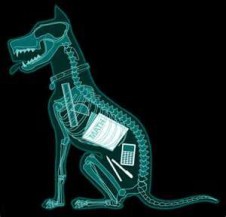Laboratory and Diagnostics
If your pet is sick we will thoroughly examine them to determine the cause of the illness. We may then recommend specific diagnostic blood testing and x-rays to further investigate the cause.
Full In-House Laboratory
Our laboratory capabilities include: complete blood count (CBC), blood chemistry profile, thyroid testing (total T4), Activated Clotting Time (ACT) testing, urinalysis, culture and sensitivity, fecal sample analysis, ear, skin and tumor cytology.
A CBC gives valuable information about an animal’s red blood cell and white blood cell count along with platelets. This is used to help determine if there are any signs of anemia, dehydration, infections or clotting disorder present. A blood chemistry profile provides information about the function of the major internal organs including the liver, kidneys, pancreas, glucose level, and electrolytes. This information can be invaluable when an animal is sick, or in screening pets prior to routine surgeries to determine if there are any underlying problems present. Some animals may have an indication of either a thyroid hormone deficiency or excess and can be checked by performing a thyroid test. This can help to determine if thyroid medications are needed or to monitor levels for those already on thyroid medication. Some pets may have signs of a bleeding disorder and a clotting or ACT test can be done to help to determine the cause and how to treat them. A urinalysis can provide information about the function of the kidneys, a urinary tract infection and the potential for urinary stone formation by checking for crystals. If an abnormality is found a urine culture may be performed to determine the most appropriate antibiotic to use. A fecal sample analysis will give valuable information about numerous intestinal parasites and over growths of certain types of bacteria that can lead to diarrhea. If any animal has an ear problem, skin lesion or tumor, these can be analyzed by collecting a sample and examining it under a microscope to look for infection, parasites and types of cells present. This can then help to determine what medication should be used or if a tumor should be removed surgically.
Digital Radiography
RADIOGRAPHS FOR OFA CERTIFICATION OF HIPS AND ELBOWS
Dogs that are going to be used for breeding should have their hips and elbows radiographed (x-rayed) for dysplasia. Dysplasia is a disorder in which the elbow and/or hip joints are not formed normally and are prone to arthritis and degenerative joint disease. These conditions can be devastating and painful as they become advanced. In early stages, there are often no physical signs of lameness and only by taking x-rays will a problem be found. These diseases are hereditary and will be passed on to future generations, so if problems are seen on x-rays, these dogs should not be used for breeding. For this reason, x-rays of potential breeding dogs should be taken when the dog is fully mature at 2 years of age. These x-rays should be submitted to the Orthopedic Foundation for Animals (OFA) where they will be given a rating of excellent, good, fair or poor/dysplastic. When you bring your dog in for x-rays please bring your dog’s registration papers which should include their registered name, number and date of birth. You will also need to have the registration numbers of the parents. Your dog will need to be microchipped in order to submit the application. This can be done at the time of x-rays. Some dogs may need sedation in order to obtain adequate x-rays.
Where to Find Us:
Pierce Vet Clinic
707 N Brown St
PO box 657
Ellsworth, WI 54011
Phone: (715)-273-4632
Fax: (715)-273-7970
Email:
piercevetclinic@yahoo.com
Follow us on Facebook!
Regular Business Hours
Monday-Friday
8:00 AM to 5:00 PM
Saturday
8:00 AM to 1:00 PM
Your pet's own online profile!
Apply for your Care Credit Account today!









